Unit 3 I'm more outgoing than my sister Section A (1a-2d)原创教学课件(共44张PPT)
文档属性
| 名称 | Unit 3 I'm more outgoing than my sister Section A (1a-2d)原创教学课件(共44张PPT) |
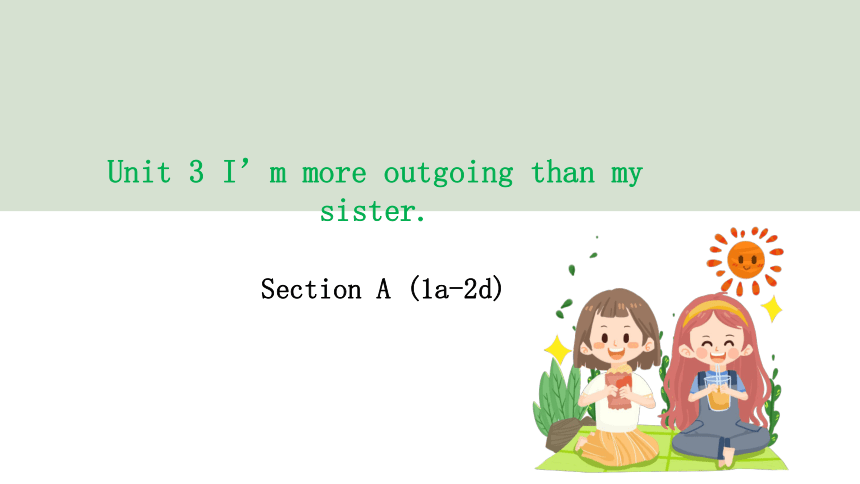
|
|
| 格式 | pptx | ||
| 文件大小 | 50.5MB | ||
| 资源类型 | 试卷 | ||
| 版本资源 | 人教新目标(Go for it)版 | ||
| 科目 | 英语 | ||
| 更新时间 | 2022-10-14 00:00:00 | ||
图片预览

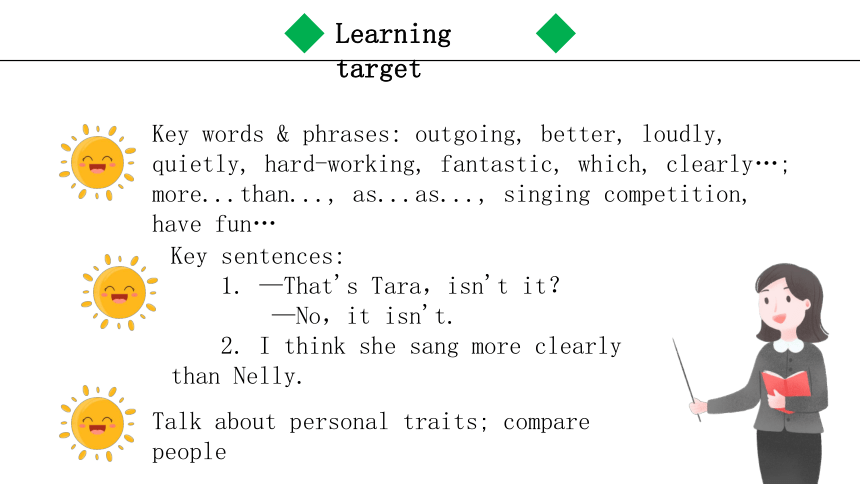
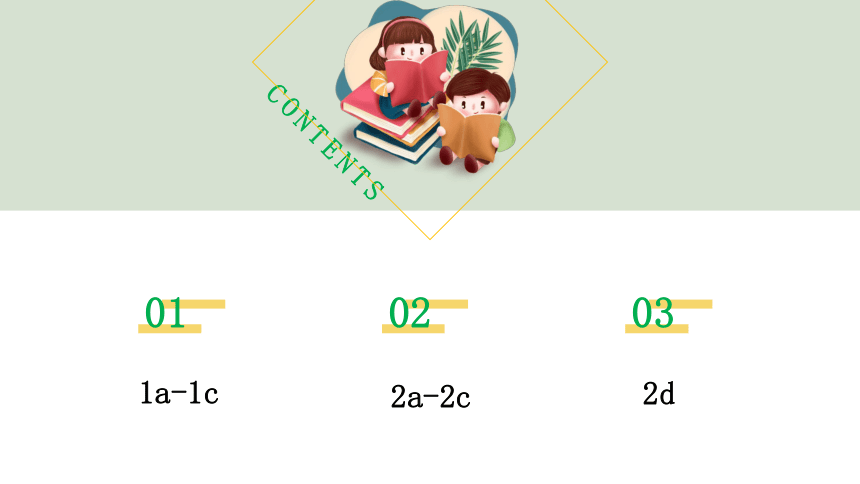
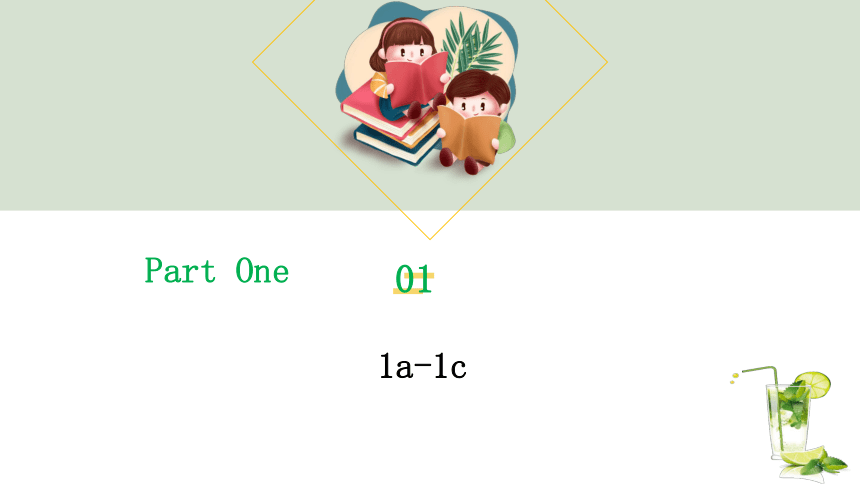
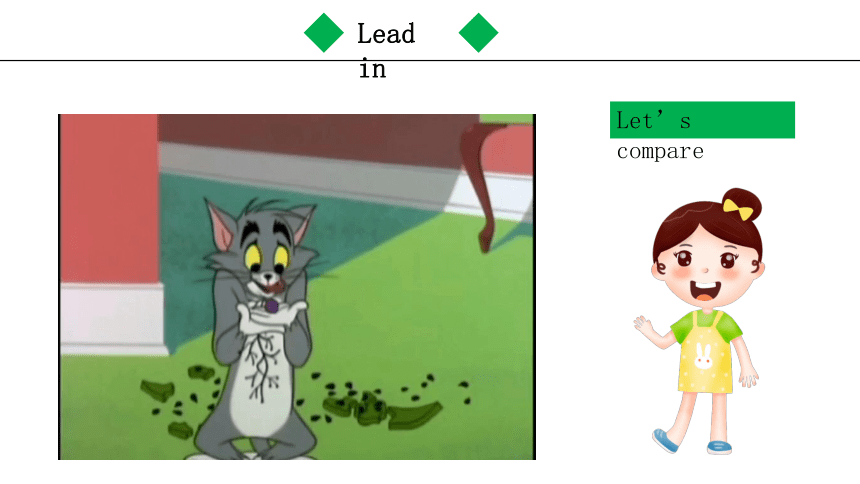
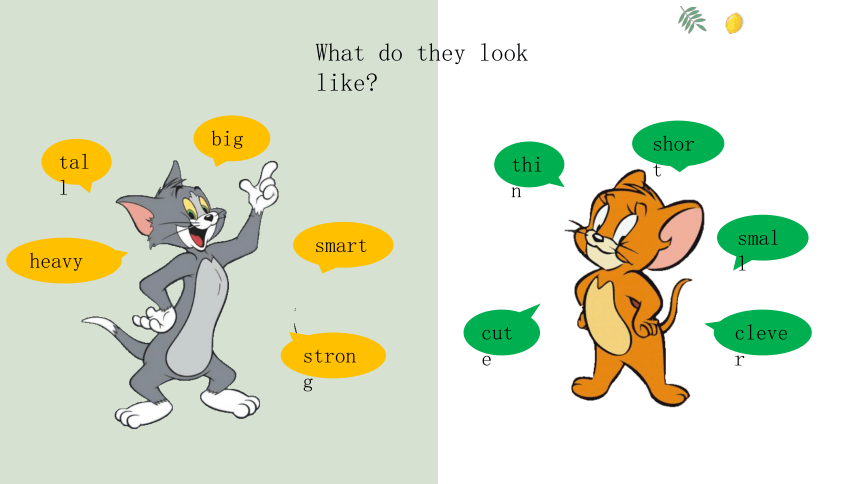
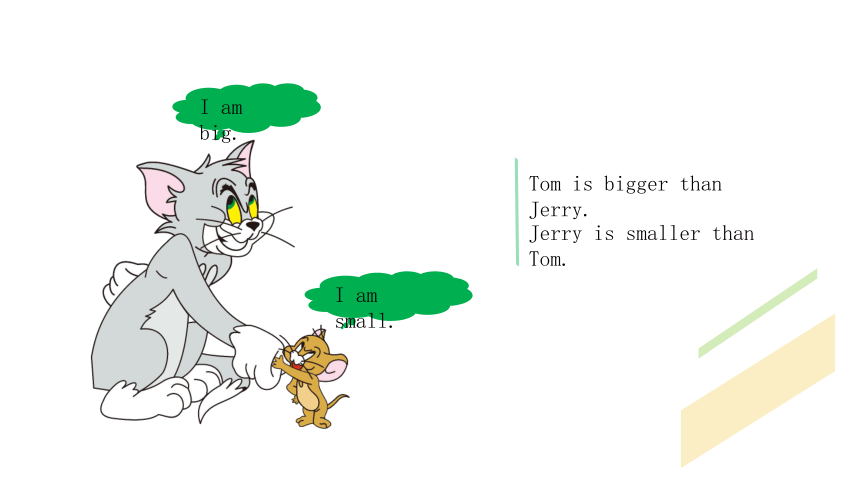
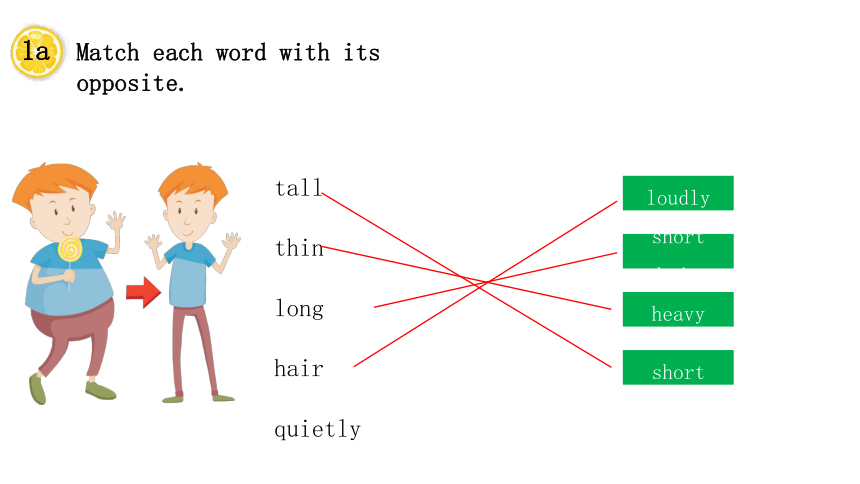
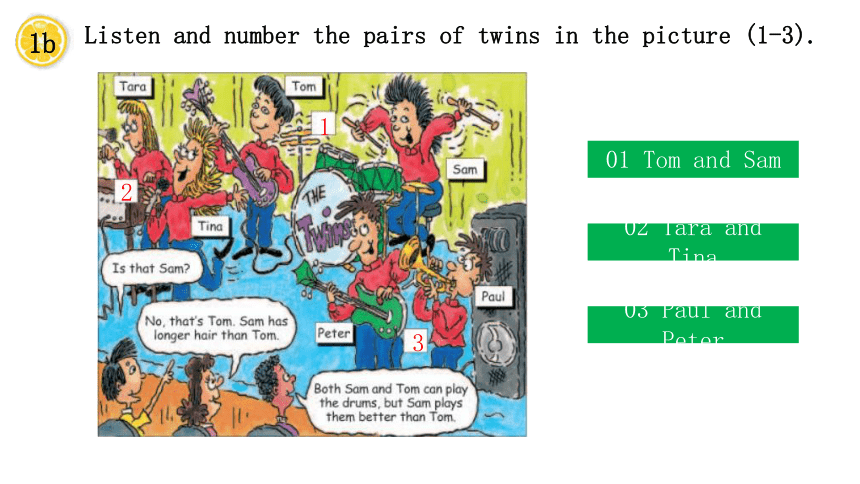
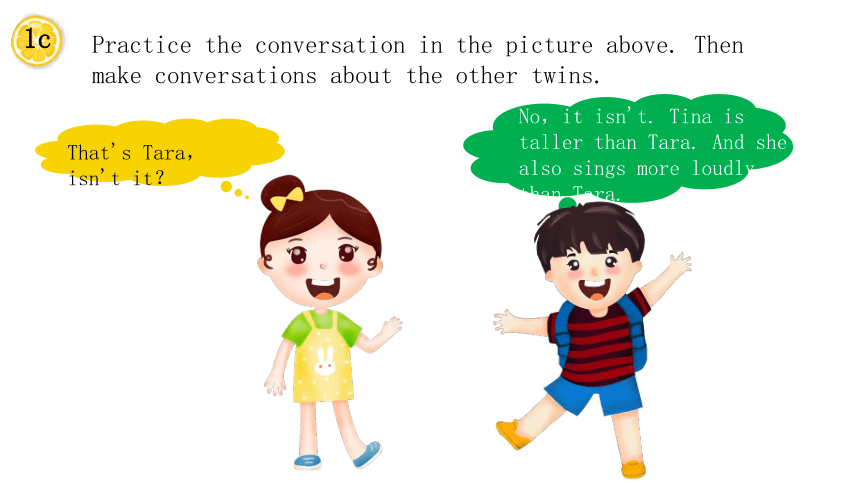
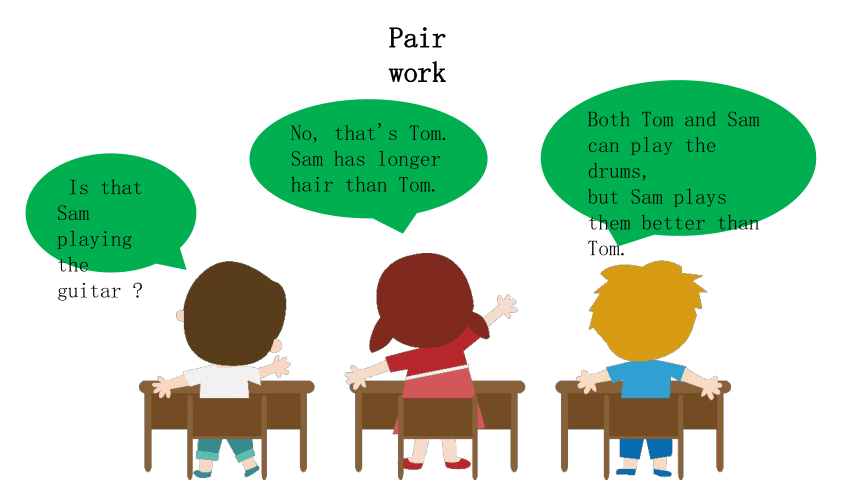
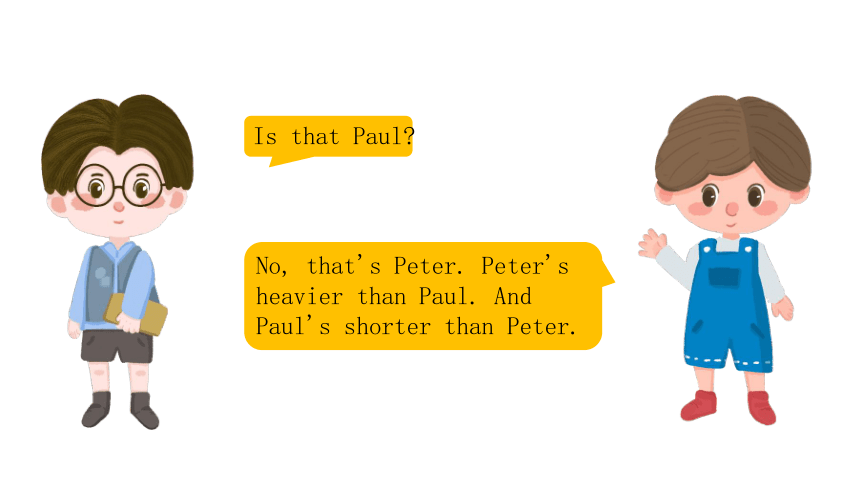
文档简介
(共44张PPT)
Unit 3 I’m more outgoing than my sister.
Section A (1a-2d)
Learning targets
Key words & phrases: outgoing, better, loudly, quietly, hard-working, fantastic, which, clearly…; more...than..., as...as..., singing competition, have fun…
Key sentences:
1. —That's Tara,isn't it?
—No,it isn't.
2. I think she sang more clearly than Nelly.
Talk about personal traits; compare people
Learning target
01
02
2a-2c
1a-1c
CONTENTS
03
2d
01
1a-1c
Part One
Lead in
Let’s compare
What do they look like
small
tall
short
strong
thin
heavy
smart
clever
cute
big
I am big.
I am small.
Tom is bigger than Jerry.
Jerry is smaller than Tom.
Match each word with its opposite.
1a
tall
thin
long hair
quietly
loudly
short hair
heavy
short
Listen and number the pairs of twins in the picture (1-3).
1b
Sam and Tom
Tara and Tina
Paul and Peter
1.
2.
3.
1
2
3
01 Tom and Sam
02 Tara and Tina
03 Paul and Peter
Practice the conversation in the picture above. Then make conversations about the other twins.
1c
That's Tara,isn't it?
No,it isn't. Tina is taller than Tara. And she also sings more loudly than Tara.
Both Tom and Sam can play the drums,
but Sam plays them better than Tom.
Pair work
Is that Sam playing the guitar
No, that's Tom. Sam has longer hair than Tom.
Is that Paul
No, that's Peter. Peter's heavier than Paul. And Paul's shorter than Peter.
Language point 1
both的用法
(1)both作代词,意为“两个;两个都”,用以指代上文中提到的两个人或两个物,作主语时谓语动词用复数形式。一般位于be动词、情态动词、助动词之后,行为动词之前。
My parents both like hiking.
我父母都喜欢远足。
(2)both作形容词,意为“两个;两个都”,修饰名词时放在the,these或my等词之前。
Both his brothers are policemen.
他的两个哥哥都是警察。
(3)both的常用短语
·
1
2
3
4
both...and...意为“…和…都”,表示并列的两者,强调“两者;两方面都”,连接两个名词(代词);作主语时,谓语动词用复数。
Both New York and London have traffic problems.
纽约和伦敦都有交通问题。
both of...“(两个)……都”其后跟表示数目为两个的复数名词或代词宾格时,谓语动词用复数。
Both of the twins enjoy listening to Chinese history stories.
这对双胞胎都喜欢听中国历史故事。
(4)辨析both与all
He can both swim and skate.他会游泳和滑冰。
都
all
both
adj. & pron.
两个;两个都
adj. & pron.
三者;三者以上都
1. Lucy and Mary _____ hard-working at English, they speak English very well.
A. are both B. both are C. is both D. both is
Exercise
解析 句意:露西和玛丽两个都在英语方面很努力,她们讲英语讲的很好。表示两个人都……,主语是复数be动词要用复数; both用来指代前面提到两个人,一般位于be动词之后,故选A。
A
解析 句意:我喜欢唱歌和跳舞,我认为它们很有趣。表示两件事主语都喜欢,两者都……,故选C; 而either…or 表示:要么/或者……要么/或者……; neither…nor 表示:既不……也不……; not…but 表示:……不……但是……。
2. I like _____ singing _____ dancing, I think they are interesting.
A. either…or B. neither…nor C. both…and D. not…but
C
loudly adv. 喧闹地;
大声地;响亮地
Don’t talk so loudly. All the students are sitting quietly in the library.
不要这么大声说话。所有的学生都安静地坐在图书馆里。
Language point 2
loudly的用法
loudly是通过形容词loud加后缀“-ly”转变而来的副词。
The audience laughed loudly at the joke.
观众听到这个笑话后大笑起来。
【拓展】一般情况下,形容词之后加-ly或适当改变词尾之后再加-ly可转变为副词。类似的词有:
(1)quiet安静的;轻柔的→ quietly轻声地;轻柔地;安静地
(2)clear清楚的;清晰的→ clearly清楚地;清晰地
(3)true真正的;确实的
→ truly真正;确实
(4)serious严肃的;稳重的→ seriously严重地;严肃地;认真地
2.I heard a sound just now, what happened (loud)
1. They played the music at the party.(loud)
loudly
loud
解析 句意:他们在派对上演奏的音乐很响亮,这里的“响亮”用于修饰行为动词played ,故把loud(形容词)加后缀ly变为loudly(副词).
解析 句意:刚刚我听到了一阵很大的声音,这里所要填的词用于修饰名词sound,故填loud
Exercise
02
2a-2c
Part two
Listen. Are the words in the box used with -(i)er or more Complete the charts.
2a
lazy
funny
(run) fast
friendly
(jump) high
outgoing
(work) hard
hard-working
(get up) early
smart
-er / -ier more
friendly outgoing
funny
hard-working
fast
high
hard
early
smart
lazy
比较级是怎么变化的呢?
tall taller
fast faster
nice nicer
thin thinner
(以不发音的字母e结尾的+r)
(一般在词尾 + er)
原形
比较级
(重读闭音节词词尾只有一个辅音字母时,先双写辅音字母再 + er)
early earlier
outgoing
more outgoing
(以辅音字母+y结尾的单 词,变y为i + er)
(多音节词和部分双音节词前加more)
Language point
Listen again. How are Tina and Tara different Fill in the boxes.
2b
Tina…
is more outgoing than Tara.
Tara...
works as hard as Tina.
as ... as ... 意为“像 / 和……一样……”,两个as中间用形容词或副词的原级。
as ... as ... 的否定形式为not as / so ... as ...,意为“不像……那样……”
Language point 1
hard-working adj.工作努力的;辛勤的
Mike is hard-working and he does well in English.
迈克很勤奋, 英语学得很好。
考点 词性 含义
hard-working 形容词 工作努力的;辛勤的
hard work 名词短语 艰苦的工作
work hard 动词短语 努力工作
Though I work hard, I can't finish the hard work.
尽管我努力工作, 但我还是不能完成这项艰苦的工作。
Language point 2
Compare yourself with your partner.
more outgoing
more friendly
more hard-working
…
taller
heavier
funnier
thinner
smarter
…
Pair work
You are smarter than me,
but I’m funnier than you.
You are taller than me,
but I’m thinner than you.
.... Note:
*** means Sam is taller than Tom.
*** *
*** ***
*** *
*** *
No, he isn’t. Sam is smarter than Tom.
Student A, look at the chart on the right. Student B, look at the chart on Page 81. Ask and answer questions about Sam and Tom.
2c
Is Tom smarter than Sam
smart
tall
run fast
get up early
thin
funny
hard-working
friendly
Sam
Tom
.... Note:
*** means Sam is taller than Tom.
*** *
*** ***
*** *
*** *
smart
tall
run fast
get up early
thin
funny
hard-working
friendly
Sam
Tom
Yes, he is.
Is Sam taller than Tom
03
2d
Part three
Julie:Did you like the singing competition yesterday, Anna
Anna:Oh, it was fantastic! Nelly sang so well!
Julie:Well, I think Lisa sang better than Nelly.
Anna:Oh, which one was Lisa
Julie:The one with shorter hair. I think she sang more clearly than Nelly.
Anna:Yes, but Nelly danced better than Lisa.
Julie:You can tell that Lisa really wanted to win, though.
Anna:Well, everyone wants to win. But the most important
thing is to learn something new and have fun.
Role-play the conversation.
2d
1. Did you like the singing competition yesterday, Anna
The singing competition was very interesting yesterday.
昨天的歌唱比赛很有趣。
Language points
competition n. 比赛;竞赛;竞争
fantastic adj.
极好的;了不起的
Look! Our English newspaper is really fantastic.
看!我们的英语报真是太棒了。
2. Oh, it was fantastic!
which pron. & adj. 哪一个;哪一些
指上文或下文提到的几个名词中的一个或一些。
Which is your bike, Mary
哪一辆是你的自行车,玛丽?
3. Which one was Lisa
win v. (won, won) 获胜;赢得
It’s easy for us to win the game.
我们赢得这场比赛很容易。
Yesterday I beat my classmate at chess. He won only one set,while I won two sets.
昨天下棋我赢了我同学。他只赢了一盘,而我赢了两盘。
4. You can tell that Lisa really wanted to win, though.
辨析win和beat的用法
词义 用法区别 例句
win v. (won, won) 获胜;赢得 win后接表示事物的名词或代词作宾语,在句子中通常与game,match,prize等词搭配,表示在某项活动或比赛中获胜。 They do their best to win the medals. 他们尽最大的努力去赢得奖牌。
beat v. (beat, beaten) 打败 beat后接表示人及人的群体名词或代词作宾语,常用于游戏或比赛中战胜某人或打败某人。 He always beats me in tennis. 他打网球总是赢我。
Though adv. 不过,可是,然而。
conj. 虽然,尽管,不过。
Though / Although I work hard, I can't finish the hard work.
尽管我努力工作, 但我还是不能完成这项艰苦的工作。
用作副词,尤用于句末补充说明,使语气减弱
用作连词,可和although互换,两者大致同义,只是 although 比 though 更为正式;though/ although与but 不能同时用在一个句子中
although与though的用法区别
Although conj. 虽然;尽管;即使;不过;然而;不用作副词,且一般放在句首。
用于习语:在 as though(好像,仿佛),even though(即使,纵然)等固定短语中不能用 although:
She closed her eyes as though she were tired. 她闭上眼,仿佛很疲劳似的。
even though I have opposed him, He is an honest man, I must say. 尽管我反对过他,我还得说他是一个诚实的人。
have fun 玩得开心
have fun doing sth. 做某事很开心
=have a good / great time doing sth.
I have fun / a good time living with
my grandparents.
5. But the most important thing is to learn something new and have fun.
Exercise
1. Bill's sister looks _____________ (outgoing) than Bill.
2. Our school held (举行) three chess ___________ (competition) last year.
3. Who plays the guitar ________ (well), Kate or Lisa
4. They tried their best and ________ (win) the game at last.
5. Amy didn't say or do anything. She sat there ________ (quiet).
more outgoing
competitions
better
won
quietly
根据句意及提示填空:
Homework
1. 背诵比较级的变化规则,练习把原级变为比较级。
2. Write about the things that are the same and different between you and your best friend.
NEXT
I’m more outgoing than my sister.
Section A (Grammar-3c)
Unit 3 I’m more outgoing than my sister.
Section A (1a-2d)
Learning targets
Key words & phrases: outgoing, better, loudly, quietly, hard-working, fantastic, which, clearly…; more...than..., as...as..., singing competition, have fun…
Key sentences:
1. —That's Tara,isn't it?
—No,it isn't.
2. I think she sang more clearly than Nelly.
Talk about personal traits; compare people
Learning target
01
02
2a-2c
1a-1c
CONTENTS
03
2d
01
1a-1c
Part One
Lead in
Let’s compare
What do they look like
small
tall
short
strong
thin
heavy
smart
clever
cute
big
I am big.
I am small.
Tom is bigger than Jerry.
Jerry is smaller than Tom.
Match each word with its opposite.
1a
tall
thin
long hair
quietly
loudly
short hair
heavy
short
Listen and number the pairs of twins in the picture (1-3).
1b
Sam and Tom
Tara and Tina
Paul and Peter
1.
2.
3.
1
2
3
01 Tom and Sam
02 Tara and Tina
03 Paul and Peter
Practice the conversation in the picture above. Then make conversations about the other twins.
1c
That's Tara,isn't it?
No,it isn't. Tina is taller than Tara. And she also sings more loudly than Tara.
Both Tom and Sam can play the drums,
but Sam plays them better than Tom.
Pair work
Is that Sam playing the guitar
No, that's Tom. Sam has longer hair than Tom.
Is that Paul
No, that's Peter. Peter's heavier than Paul. And Paul's shorter than Peter.
Language point 1
both的用法
(1)both作代词,意为“两个;两个都”,用以指代上文中提到的两个人或两个物,作主语时谓语动词用复数形式。一般位于be动词、情态动词、助动词之后,行为动词之前。
My parents both like hiking.
我父母都喜欢远足。
(2)both作形容词,意为“两个;两个都”,修饰名词时放在the,these或my等词之前。
Both his brothers are policemen.
他的两个哥哥都是警察。
(3)both的常用短语
·
1
2
3
4
both...and...意为“…和…都”,表示并列的两者,强调“两者;两方面都”,连接两个名词(代词);作主语时,谓语动词用复数。
Both New York and London have traffic problems.
纽约和伦敦都有交通问题。
both of...“(两个)……都”其后跟表示数目为两个的复数名词或代词宾格时,谓语动词用复数。
Both of the twins enjoy listening to Chinese history stories.
这对双胞胎都喜欢听中国历史故事。
(4)辨析both与all
He can both swim and skate.他会游泳和滑冰。
都
all
both
adj. & pron.
两个;两个都
adj. & pron.
三者;三者以上都
1. Lucy and Mary _____ hard-working at English, they speak English very well.
A. are both B. both are C. is both D. both is
Exercise
解析 句意:露西和玛丽两个都在英语方面很努力,她们讲英语讲的很好。表示两个人都……,主语是复数be动词要用复数; both用来指代前面提到两个人,一般位于be动词之后,故选A。
A
解析 句意:我喜欢唱歌和跳舞,我认为它们很有趣。表示两件事主语都喜欢,两者都……,故选C; 而either…or 表示:要么/或者……要么/或者……; neither…nor 表示:既不……也不……; not…but 表示:……不……但是……。
2. I like _____ singing _____ dancing, I think they are interesting.
A. either…or B. neither…nor C. both…and D. not…but
C
loudly adv. 喧闹地;
大声地;响亮地
Don’t talk so loudly. All the students are sitting quietly in the library.
不要这么大声说话。所有的学生都安静地坐在图书馆里。
Language point 2
loudly的用法
loudly是通过形容词loud加后缀“-ly”转变而来的副词。
The audience laughed loudly at the joke.
观众听到这个笑话后大笑起来。
【拓展】一般情况下,形容词之后加-ly或适当改变词尾之后再加-ly可转变为副词。类似的词有:
(1)quiet安静的;轻柔的→ quietly轻声地;轻柔地;安静地
(2)clear清楚的;清晰的→ clearly清楚地;清晰地
(3)true真正的;确实的
→ truly真正;确实
(4)serious严肃的;稳重的→ seriously严重地;严肃地;认真地
2.I heard a sound just now, what happened (loud)
1. They played the music at the party.(loud)
loudly
loud
解析 句意:他们在派对上演奏的音乐很响亮,这里的“响亮”用于修饰行为动词played ,故把loud(形容词)加后缀ly变为loudly(副词).
解析 句意:刚刚我听到了一阵很大的声音,这里所要填的词用于修饰名词sound,故填loud
Exercise
02
2a-2c
Part two
Listen. Are the words in the box used with -(i)er or more Complete the charts.
2a
lazy
funny
(run) fast
friendly
(jump) high
outgoing
(work) hard
hard-working
(get up) early
smart
-er / -ier more
friendly outgoing
funny
hard-working
fast
high
hard
early
smart
lazy
比较级是怎么变化的呢?
tall taller
fast faster
nice nicer
thin thinner
(以不发音的字母e结尾的+r)
(一般在词尾 + er)
原形
比较级
(重读闭音节词词尾只有一个辅音字母时,先双写辅音字母再 + er)
early earlier
outgoing
more outgoing
(以辅音字母+y结尾的单 词,变y为i + er)
(多音节词和部分双音节词前加more)
Language point
Listen again. How are Tina and Tara different Fill in the boxes.
2b
Tina…
is more outgoing than Tara.
Tara...
works as hard as Tina.
as ... as ... 意为“像 / 和……一样……”,两个as中间用形容词或副词的原级。
as ... as ... 的否定形式为not as / so ... as ...,意为“不像……那样……”
Language point 1
hard-working adj.工作努力的;辛勤的
Mike is hard-working and he does well in English.
迈克很勤奋, 英语学得很好。
考点 词性 含义
hard-working 形容词 工作努力的;辛勤的
hard work 名词短语 艰苦的工作
work hard 动词短语 努力工作
Though I work hard, I can't finish the hard work.
尽管我努力工作, 但我还是不能完成这项艰苦的工作。
Language point 2
Compare yourself with your partner.
more outgoing
more friendly
more hard-working
…
taller
heavier
funnier
thinner
smarter
…
Pair work
You are smarter than me,
but I’m funnier than you.
You are taller than me,
but I’m thinner than you.
.... Note:
*** means Sam is taller than Tom.
*** *
*** ***
*** *
*** *
No, he isn’t. Sam is smarter than Tom.
Student A, look at the chart on the right. Student B, look at the chart on Page 81. Ask and answer questions about Sam and Tom.
2c
Is Tom smarter than Sam
smart
tall
run fast
get up early
thin
funny
hard-working
friendly
Sam
Tom
.... Note:
*** means Sam is taller than Tom.
*** *
*** ***
*** *
*** *
smart
tall
run fast
get up early
thin
funny
hard-working
friendly
Sam
Tom
Yes, he is.
Is Sam taller than Tom
03
2d
Part three
Julie:Did you like the singing competition yesterday, Anna
Anna:Oh, it was fantastic! Nelly sang so well!
Julie:Well, I think Lisa sang better than Nelly.
Anna:Oh, which one was Lisa
Julie:The one with shorter hair. I think she sang more clearly than Nelly.
Anna:Yes, but Nelly danced better than Lisa.
Julie:You can tell that Lisa really wanted to win, though.
Anna:Well, everyone wants to win. But the most important
thing is to learn something new and have fun.
Role-play the conversation.
2d
1. Did you like the singing competition yesterday, Anna
The singing competition was very interesting yesterday.
昨天的歌唱比赛很有趣。
Language points
competition n. 比赛;竞赛;竞争
fantastic adj.
极好的;了不起的
Look! Our English newspaper is really fantastic.
看!我们的英语报真是太棒了。
2. Oh, it was fantastic!
which pron. & adj. 哪一个;哪一些
指上文或下文提到的几个名词中的一个或一些。
Which is your bike, Mary
哪一辆是你的自行车,玛丽?
3. Which one was Lisa
win v. (won, won) 获胜;赢得
It’s easy for us to win the game.
我们赢得这场比赛很容易。
Yesterday I beat my classmate at chess. He won only one set,while I won two sets.
昨天下棋我赢了我同学。他只赢了一盘,而我赢了两盘。
4. You can tell that Lisa really wanted to win, though.
辨析win和beat的用法
词义 用法区别 例句
win v. (won, won) 获胜;赢得 win后接表示事物的名词或代词作宾语,在句子中通常与game,match,prize等词搭配,表示在某项活动或比赛中获胜。 They do their best to win the medals. 他们尽最大的努力去赢得奖牌。
beat v. (beat, beaten) 打败 beat后接表示人及人的群体名词或代词作宾语,常用于游戏或比赛中战胜某人或打败某人。 He always beats me in tennis. 他打网球总是赢我。
Though adv. 不过,可是,然而。
conj. 虽然,尽管,不过。
Though / Although I work hard, I can't finish the hard work.
尽管我努力工作, 但我还是不能完成这项艰苦的工作。
用作副词,尤用于句末补充说明,使语气减弱
用作连词,可和although互换,两者大致同义,只是 although 比 though 更为正式;though/ although与but 不能同时用在一个句子中
although与though的用法区别
Although conj. 虽然;尽管;即使;不过;然而;不用作副词,且一般放在句首。
用于习语:在 as though(好像,仿佛),even though(即使,纵然)等固定短语中不能用 although:
She closed her eyes as though she were tired. 她闭上眼,仿佛很疲劳似的。
even though I have opposed him, He is an honest man, I must say. 尽管我反对过他,我还得说他是一个诚实的人。
have fun 玩得开心
have fun doing sth. 做某事很开心
=have a good / great time doing sth.
I have fun / a good time living with
my grandparents.
5. But the most important thing is to learn something new and have fun.
Exercise
1. Bill's sister looks _____________ (outgoing) than Bill.
2. Our school held (举行) three chess ___________ (competition) last year.
3. Who plays the guitar ________ (well), Kate or Lisa
4. They tried their best and ________ (win) the game at last.
5. Amy didn't say or do anything. She sat there ________ (quiet).
more outgoing
competitions
better
won
quietly
根据句意及提示填空:
Homework
1. 背诵比较级的变化规则,练习把原级变为比较级。
2. Write about the things that are the same and different between you and your best friend.
NEXT
I’m more outgoing than my sister.
Section A (Grammar-3c)
同课章节目录
- Unit 1 Where did you go on vacation?
- Section A
- Section B
- Unit 2 How often do you exercise?
- Section A
- Section B
- Unit 3 I'm more outgoing than my sister.
- Section A
- Section B
- Unit 4 What's the best movie theater?
- Section A
- Section B
- Unit 5 Do you want to watch a game show?
- Section A
- Section B
- Unit 6 I'm going to study computer science.
- Section A
- Section B
- Unit 7 Will people have robots?
- Section A
- Section B
- Unit 8 How do you make a banana milk shake?
- Section A
- Section B
- Unit 9 Can you come to my party?
- Section A
- Section B
- Unit 10 If you go to the party, you'll have a grea
- Section A
- Section B
